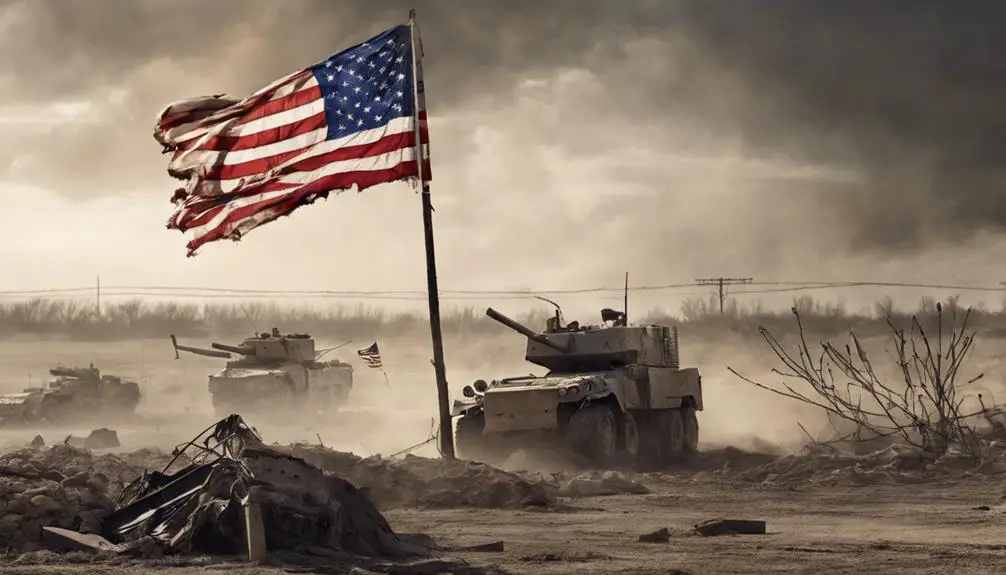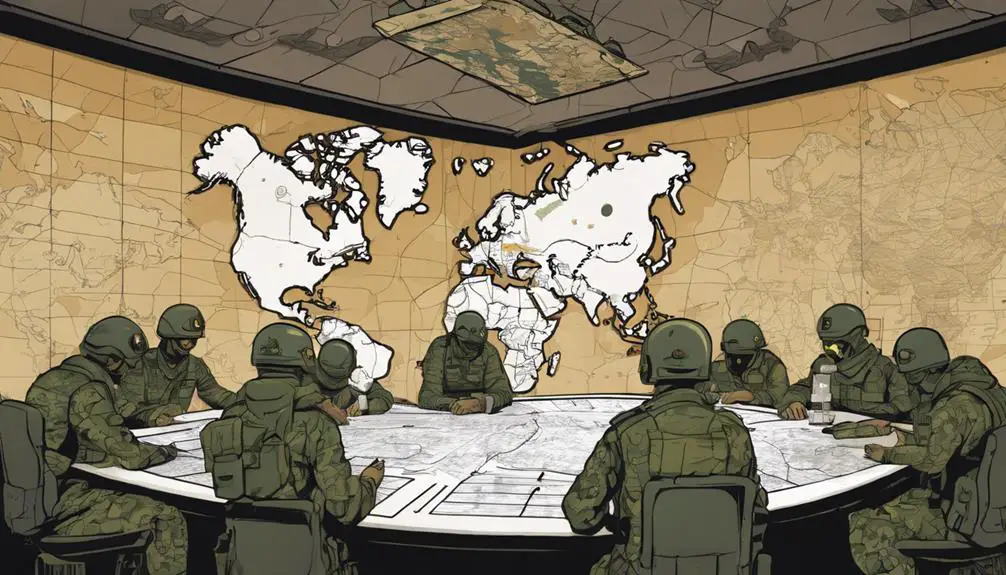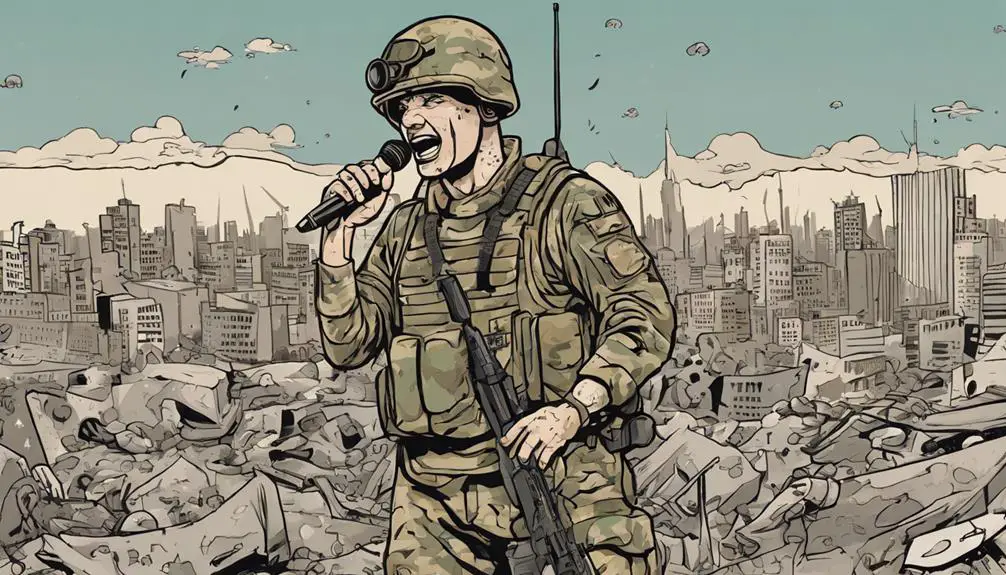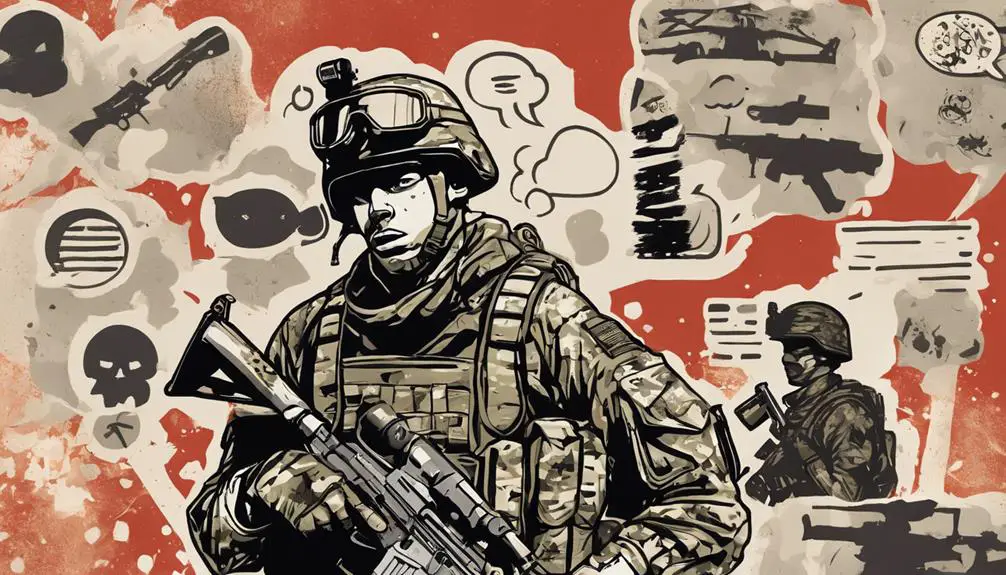You're about to immerse yourself in the fascinating world of military slang, where troops use colorful language to navigate the chaos of the battlefield, communicate effectively, and even inject humor into the most stressful situations. From 'Tommy' and 'Digger' to 'grunt' and 'squid,' military slang has emerged as an essential part of combat culture. It's a language that's both humorous and irreverent, with phrases like 'Hurry up and wait' and 'Embrace the suck.' As you explore this world, you'll discover more about the terminology that dominates military operations, from vehicles to mission parameters, and how it all comes together to shape the military experience. From here, the battle slang gets even more intense.
Slang of the Battlefield Born

On the chaotic battlefields of World War I, you might've heard soldiers yelling 'Over the top!' – a phrase that signaled the start of a perilous charge into no man's land. This phrase is just one example of the unique slang that emerged on the battlefield.
Battlefield banter, as it's often called, was a vital part of combat culture. It was a way for soldiers to cope with the stress and uncertainty of war, and to create a sense of camaraderie with their fellow troops.
In the trenches, soldiers developed a distinct language that was often humorous, sarcastic, and irreverent. They'd use phrases like 'Jerry' to refer to the enemy, or 'Blighty' to describe a wound that would get them sent back to Britain.
This slang was more than just a quirk – it was a way for soldiers to assert their humanity in the face of unimaginable horror. It was a way to mock the absurdity of war, and to find some semblance of normalcy in the chaos.
As you navigated the treacherous landscape of no man's land, you'd hear this slang being tossed around, a tribute to the resilience of the human spirit.
Terms for Troops and Ranks
As you interacted with fellow soldiers, you'd quickly learn the colorful nicknames for various troops and ranks, like 'Tommy' for a British private or 'Digger' for an Australian soldier. These troop nicknames not only added flavor to military lingo but also served as a way to identify and connect with fellow comrades.
You'd also learn that rank insignia played an essential role in distinguishing between ranks, with each insignia denoting a specific level of authority and responsibility. From the single chevron of a private to the multiple stars of a general, rank insignia was a vital part of military hierarchy.
As you navigated the military landscape, you'd become familiar with terms like 'grunt' for an infantryman, 'squid' for a sailor, and 'zoomie' for an airman. These nicknames and insignia would become an integral part of your military vocabulary, helping you communicate effectively and efficiently with your fellow troops.
Ops and Missions Decoded

You'll soon learn that military operations and missions have their own set of cryptic terms and abbreviations, designed to convey complex information quickly and securely. As you immerse yourself in the world of ops and missions, you'll encounter terms like Situation Reports (SITREPs) and Mission Parameters.
A SITREP provides a concise summary of the current situation on the ground, including friendly and enemy forces, terrain, and weather. It's essential for commanders to understand the situation to make informed decisions.
Mission Parameters, on the other hand, outline the specific objectives, constraints, and rules of engagement for a particular operation. They define what needs to be accomplished, how to achieve it, and what resources are available. Understanding these parameters is vital for a successful mission.
You'll also come across terms like OPORD (Operations Order), which outlines the plan of action, and FRAGO (Fragmentary Order), which provides updates or changes to the original plan. As you learn these terms, you'll gain a deeper understanding of how military operations are planned and executed.
Military Jargon for Vehicles
Military vehicles have their own set of specialized terms, and understanding them is crucial for effective communication on the battlefield. You'll need to know the lingo to navigate the 'motorpool madness' and get familiar with the 'tactical rides' used in various operations.
For instance, a 'Humvee' refers to the High Mobility Multipurpose Wheeled Vehicle, a versatile vehicle used for transportation and reconnaissance.
A 'MRAP' (Mine-Resistant Ambush Protected) is a type of armored vehicle designed to withstand IEDs and ambushes.
You might also hear 'LAV' (Light Armored Vehicle), which is a fast and agile vehicle for reconnaissance and combat missions.
When communicating with your team, using the correct terminology can make all the difference.
For example, you might request 'transport' via a 'five-ton' (a 5-ton cargo truck) or 'nine-line' (a standardized report format) for a 'CASEVAC' (Casualty Evacuation) mission.
Mastering these terms will help you navigate the complex world of military vehicles and ensure seamless communication with your team.
Funny Phrases From the Front

From the trenches to the mess hall, soldiers have coined humorous phrases that poke fun at the absurdities of military life. War clichés and Army antics are abundant, and you've probably heard some of them before. But have you heard these gems?
- 'Hurry up and wait': The motto of the military, where you're always rushing to get somewhere, only to wait around for hours.
- 'Embrace the suck': A phrase used to encourage you to accept the hardships of military life and make the best of it.
- 'O-dark-thirty': The ridiculously early hour when you're required to wake up for morning formation or patrol.
- 'Lost the bubble': When you've lost track of what's going on or forgotten important information.
- 'FTA (Fix To Apply)': A sarcastic way of saying 'fix it yourself' when someone asks for help with a problem they should be able to solve on their own.
These phrases are just a few examples of the humor that's woven into the fabric of military culture. They're a reminder that even in the most difficult and trying times, there's always room for a little levity and humor.
Frequently Asked Questions
What's the Origin of "Hooah" in Military Slang?
You're probably wondering where the iconic 'Hooah' battle cry came from. Its origins date back to the 1960s, when it emerged as a motivational chant among Army Rangers.
As the Army chant evolved, 'Hooah' became a universal expression of enthusiasm, motivation, and camaraderie. Today, it's an integral part of military culture, symbolizing strength, unity, and morale.
You'll hear it loud and clear in training, operations, and even everyday conversations among service members.
Are Military Slang Terms Used Universally Across Branches?
You're wondering if military slang terms are used universally across branches. The truth is, they're not.
While some terms like 'hooah' are widely used, others vary between branches. Branch variations and service differences lead to distinct slang cultures.
For instance, the Navy has its own lingo, like 'deck' for floor, whereas the Army uses 'hooah' to express enthusiasm.
It's essential to recognize these differences to avoid confusion when communicating across branches.
Do Military Slang Terms Change Over Time?
You might wonder if military slang terms change over time. The answer is yes, they do.
As languages evolve, so do military slang terms. The evolution of terminology is a natural process, driven by cultural and social changes.
You see, language adaptation is a key aspect of military culture, and slang terms are no exception. As new generations join the forces, they bring new expressions and adapt existing ones, ensuring the language stays relevant and fresh.
Are There Any Military Slang Terms Specific to Certain Wars?
You're wondering if certain wars have their own unique military slang terms. The answer is yes!
For instance, Vietnam had its own lingo, like 'grunt' for infantrymen and 'LZ' for landing zones. During Desert Storm, slang like 'sandstorm' for a messy situation and 'haji' for Iraqi civilians emerged.
Each conflict brings its own set of colloquialisms, reflecting the unique experiences and environments of those who serve.
Can Civilians Use Military Slang Without Being Seen as Pretentious?
When using military slang, you need to be mindful of authenticity matters. Cultural appropriation can be a turn-off, making you seem pretentious.
Avoid using terms you don't truly understand or haven't earned the right to use. If you're not a veteran, it's best to stick to casual, widely-accepted phrases. Don't try to fake it; people will notice.
Be respectful and genuine, and you'll avoid coming across as a poser. Use military slang sparingly and thoughtfully, and you'll earn credibility.
Conclusion
As you've navigated the world of military slang, you've likely picked up some valuable lingo to drop into your everyday conversations. Remember, just like a well-executed op, effective communication is key.
So, the next time you're 'hanging loose' with friends, throw in some 'military-grade' slang to show off your newfound skills. And who knows, you might just 'call in an airstrike' on boring conversations forever.







